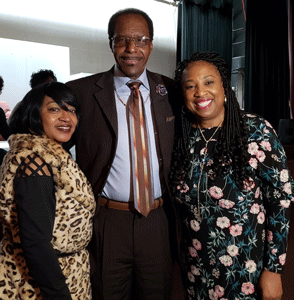On February 1, 1968, two Memphis garbage collectors, Echol Cole and Robert Walker, were crushed to death by a malfunctioning truck. Twelve days later, frustrated by the city’s response to the latest event in a long pattern of neglect and abuse of its black employees, 1,300 black men from the Memphis Department of Public Works went on strike.
The Memphis sanitation workers’ strike is remembered as an example of African-Americans standing up for themselves. During their strike, sanitation workers marched in the face of racial injustice donning signs which read “I Am A Man.” The strike is also remembered as the prelude to the assassination of the Dr. Martin Luther King Jr. Dr. King was shot by a sniper who was identified as James Earl Ray, as the civil rights leader stood on the balcony of Memphis’ Lorraine Hotel.
One local playwright has captured how this historic movement played out through the eyes of a Memphis family through her stage play drama “Tears Of The Soul.”
“Tears Of The Soul is historical and educational,” said writer Angela Wilson, who also produced and directed the gripping production. “I love Black History. As a playwright, you come across something you believe makes a good story. When I began researching James Earl Ray, I was struck by the sanitation workers’ sacrifice.”
Sanitation workers, led by collector-turned-union-organizer, T. O. Jones, and supported by the president of the American Federation of State, County, and Municipal Employees (AFSCME), Jerry Wurf, demanded recognition of their union, better safety standards, and a decent wage.
“They didn’t have anything, but were willing to stand up and say, ‘this isn’t right, and we deserve to be treated better’”, said Wilson. “I was really inspired by them and began to see them as heroes. Everyone knows about Dr. King, but I wanted to share the story of the AFSCME union workers.”
Courtesy Photo
(Left-right): Evelyn C. Liggins, Memphis sanitation worker Cleophus Smith, and Playwright Angela Wilson
The story is centered around the Barnes Family, and how the strike and impending death of Dr. King impacted their household. “Fred Barnes” (Pierre Walters) and his wife “Vivian Barnes” (Joelle Denise) endured their share of pain, which included marital challenges, militancy in their children, and the shocking news of King’s assassination. The family also included “Ida Mae” (Regina Gail Malloy), “Dexter” (Devin King), and “Gina” (Leah Mallory).
Despite the many challenges they encountered, the close-knit family weathered the storm, and grew closer together. Through “Eileen Bridgewater” (Sharon Goldner), the play also highlighted the sacrifices made by Caucasians who supported the movement.
The cast also included Robert Freemon, who portrayed Memphis sanitation worker“ Turner Davis” and Michael Roxie Johnson who played his wife “Maxine Davis.”
“Most of the cast were not even born, and had very little knowledge of this story,” said Wilson. They did research on their own and really delved into some ugly stuff. You could see that they understood what they had learned, and it came through in their performance.”
“Tears of the Soul” was performed in April and October of 2018 at the Chesapeake Arts Center located on Hammonds Ferry Road in Brooklyn, Park, Maryland. Plans are in the works for a return engagement of the production.
Pierre Walters (Fred Barnes) and Robert Freemon (Turner Davis) portrayed Memphis sanitation workers in the production.
Cleophus Smith, who was among the Memphis union workers, attended the October performance.
“He is very humble and a wealth of information,” said Wilson. “He was able to really help me to understand what it was like for them, which was something you could not read in a book.
“There are 28 remaining workers, and they travel a lot. I felt blessed and honored that he thought this was important enough to come and share this experience with us.”
Wilson is the founder of the AngelWing Project, Inc (AWP), a 501(c) 3 non-profit performing arts organization that promotes the development of the performing arts in the local community.
“Where are we today 50 years later?” asked Wilson. “There are a lot of parallels. The message of this play can help us to deal with some of the things we are dealing with today, especially when it comes to listening to one another.”
Decades later, in 2017, Memphis Mayor Jim Strickland announced a group of 14 city sanitation workers from 1968 would be getting $50,000 grants from the city, totaling $700,000.
“They did get an increase in wages, but it still took a long time,” said Wilson. “In 2017, the remaining workers were awarded back pay. It was 50 years later, but the remaining ones received a nice contribution from the city.”
AWP’s next production is RISING UP: A Dramatic Presentation of Notable African American Firsts. The admission price is $10, and will take place on February 24, 2019 at the Chesapeake Performing Arts Center.
For more information about AWP, visit www.theangelwingproject.org.


